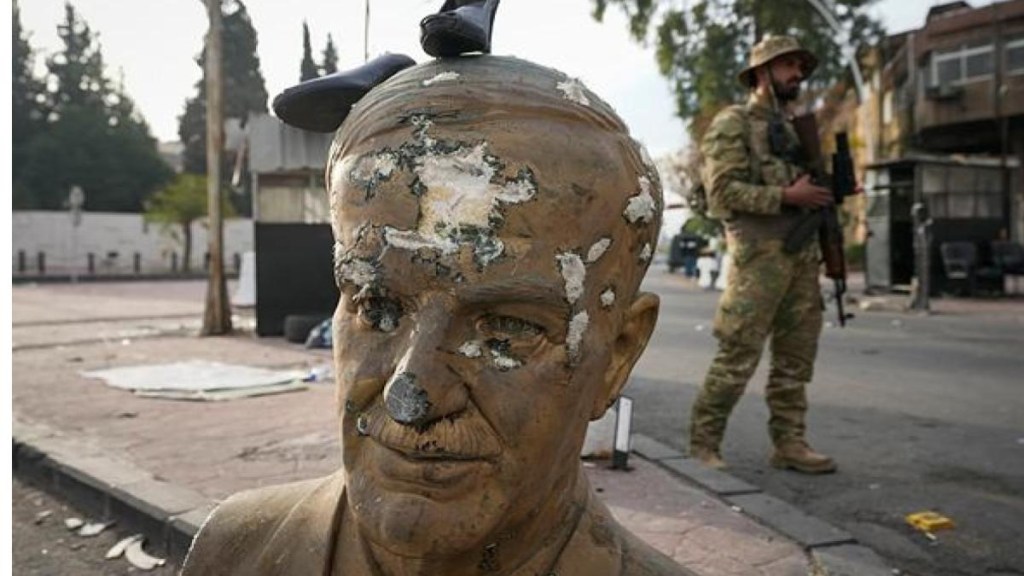Insurgents torched the tomb of Syria’s former President Hafez Assad in his hometown of Qardaha, located in the northwest Latakia province, according to reports from a war monitor and a local journalist on Wednesday, AP reported.
Hafez Assad, who ruled Syria for three decades until his death in 2000, was succeeded by his son, Bashar Assad. Both leaders governed with authoritarian control and faced accusations of brutal crackdowns, including the massacre of tens of thousands in Hama in 1982 and widespread violence during the civil war that began in 2011.
Bashar Assad was ousted over the weekend and has since sought political asylum in Russia. The Britain-based Syrian Observatory for Human Rights’ Rami Abdurrahman and journalist Qusay Noor confirmed the incident to AP.
Here’s a look at key developments in the region:
- Syria interim PM: Syria’s new interim Prime Minister, Mohammed al-Bashir, was appointed on Tuesday and will serve until March 1, 2025. One of his key priorities, as reported by Al Jazeera, is the repatriation of Syrian refugees residing abroad.
- Rapid power consolidation: Hayat Tahrir al-Sham (HTS), a group that has become the most powerful armed opposition force in Syria, quickly deployed police, installed an interim government, and initiated engagements with foreign envoys. Mohammed al-Bashir, previously governing Idlib under HTS, has been named interim prime minister, signifying the group’s dominance among opposition factions.
- Promises of inclusivity: Despite its Islamist background and classification as a terrorist group by the US and Turkey, HTS has assured Syrians it will respect minorities and foster inclusivity. These promises played a role in its swift advance to Damascus, but doubts remain about their sincerity.
- PM Netanyahu warns: Israeli Prime Minister Benjamin Netanyahu cautioned Syria’s new rulers against following Assad’s approach, urging them not to allow Iran to “re-establish” its presence in the country, following a series of large-scale attacks across Syria, as reported by Al Jazeera.
- Hezbollah reacts: Hezbollah, the Lebanese group that supported President Bashar al-Assad during Syria’s war, expressed hope that Syria’s new leaders would reject the “Israeli occupation” of their land.
- International scrutiny: The US has called for an inclusive, non-sectarian governance model in line with UN Security Council Resolution 2254, which mandates constitutional reform and free elections. However, HTS’s consolidation of power and limited engagement with diverse opposition factions have drawn criticism.
- Real risk: Russian Deputy Foreign Minister Sergei Ryabkov warned on Wednesday of a real risk that Islamic State (IS) militants could rise again in Syria, according to the state news agency RIA.
In 2011, Bashar al-Assad’s brutal crackdown on a peaceful pro-democracy movement ignited a devastating civil war that has claimed over half a million lives and displaced 12 million people.
Before him, Hafez al-Assad ruled Syria with an iron grip from 1971 until his death in 2000, when power was transferred to his son. The Assad family hails from the Alawite sect, a Shia Islam offshoot and a minority group in Syria, predominantly based in Latakia province near the Mediterranean coast and the Turkish border.
The Alawites, constituting around 10% of Syria’s population, were staunch supporters of the Assads throughout their decades in power. However, with the fall of the regime, many Alawites now fear retaliation from victorious rebel factions.
On Monday, a rebel delegation that included members of HTS and the Free Syrian Army, both Sunni Muslim groups, met with elders in Qardaha, the Assad family’s ancestral hometown. The delegation secured their support and signed a document affirming Syria’s commitment to religious and cultural diversity.
This comes after HTS and allied rebel groups captured the Syrian capital, Damascus, on Sunday, marking a significant shift in the country’s long and bloody conflict.

